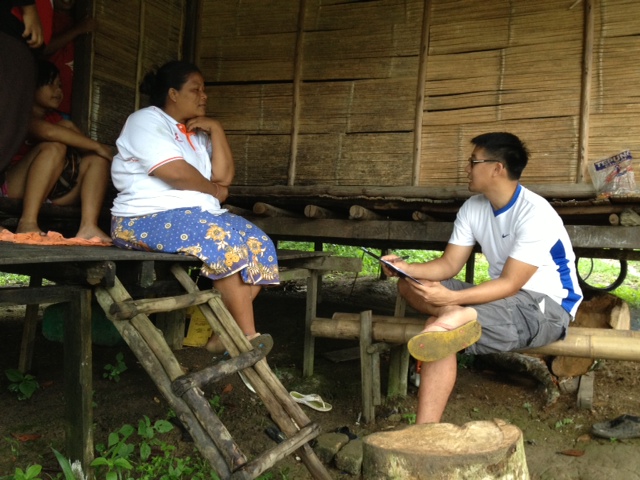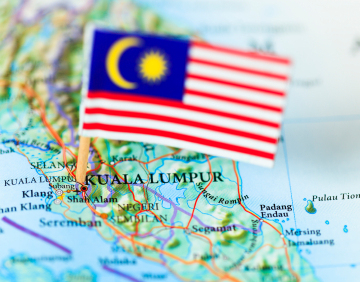What I Learnt After Four Weeks Of Asking #HowToLoveMalaysia
For a month, Mei Mei Chu went on a mission to understand what Malaysia means to different groups of people in Malaysia. She talked to the grandparents who were born before 1957, the expatriate community, the brain drain population, and the good samaritans of Malaysia. This is what she learnt from her conversations with these people.
It's the people that makes Malaysia such a great place to live in
Charlotte Pederson (in green) from Denmark having fun with her Malaysian friends.
Image via akamaihd.netWhen I asked four expatriates what they love most about Malaysia, all four had a common answer: the people. Nguyen vu Nguyen from Vietnam says he is surrounded by a wonderful group of people in and outside of work; Charlotte Pederson from Denmark loves how Malaysians are always ready to help her understand the story of Malaysia; Tracey Norkjaer from Botswana says her fondest memory is of a family whose hospitality charmed her heart and tummy: Eyad Alama from Syria is touched at how Malaysians treat him better than how Syrians would.
Sincere, mutual respect for each other despite race and religion is not foreign to Malaysia
Yeoh Hock Guan (second from right) on a trip to Langkawi with his friends at the age of 14.
Image via Judith Yeoh68-year-old Yeoh Guan Hock remembers a time where Malaysians of different races mixed freely. "We were not so conscious of our race. We treated each other as fellow humans. We respected each other’s beliefs and customs," he said. He remembers laughing about each other's idiosyncrasies without feeling offended. That was when P. Ramlee movies were patronised by all races. It's drastically different today where everyone has to be careful that their words are politically correct.
If we could be so accepting to foreigners working in Malaysia, we should be accepting to fellow Malaysians too
The four expatriates all gushed about how Malaysians were so kind and accepting to them, making them feel at home. I smiled when I heared Charlotte call Malaysia her second home, and I was touched when Eyad thanked Malaysians for being "such nice and accepting people". At the same time, stories about Malaysians spewing words of hatred to each other hit our news feed more often than not. If we could be so accepting in welcoming these foreigners, why can't we accept our fellow Malaysians?
During my chat with Yeoh, he sighed at the freedom and trust that we seemed to have lost, but he is still hopeful. "We could do it (accept each other) back then, and we can surely do it now."
Our diversity in ethnicity, religion and social economic status can be complimentary to the betterment of Malaysia
John-Son Oei taking the time to understand the struggles of the orang asli community.
Image via says.comOur diversity is one of the many things that our expatriate friends fell in love with when they came to Malaysia. Tracey and Nguyen both agree that Malaysia could be a better place to live in if we embraced all our cultural, racial and religious differences wholeheartedly.
At the same time, John-Son Oei, the founder of EPIC Homes, has seen with his own eyes how the power of diversity can be used to achieve great things. "While diversity in ethnicity, religion and social economical status have been used to cause much disunity in our country, I’ve seen it work harmoniously at every EPIC Homes build site. I see with my own eyes how our diversity is complimentary to the results and not conflicting. I believe that this can be replicated on a national scale."
Perhaps the reason for our disunity is that we don't understand the struggle of our fellow countrymen
The responsibility to create a harmonious society is not just on the government's shoulders but should be shared by all Malaysians, says John-Son Oei. "There's a huge gap between the rich and the poor, the urban and rural dwellers. This is our biggest issue, where our own people are not aware of the struggles of their fellow countrymen."
Discrimination in Malaysia is real and is enough to make a person give up their Malaysian citizenship
There were many reasons as to why Lili (not her real name), 55, decided to move to Australia and eventually take up the Australian citizenship. She could say that her job took her there, or that she wanted to give her children an overseas education. But, the deciding factor was that she was hurt by the partiality and discrimination she faced as a Chinese Malaysian citizen during her From 6 class placement, scholarship application and during her search for a job.
"I was born here, grew up here and yet was not accorded equal civil rights due as a Malaysian citizen," Lili said. "We took the step to migrate to Australia where we were extended the same benefits and privilege as the locals even though we were new emigrants... I needed to ensure that my children are given a fair go based on their merits and not on their race." This very reason is also why Lili feels more patriotism for Australia than she does for Malaysia.
Leaving your country does not mean you do not love Malaysia
Unlike Lili who has lost faith in Malaysia, Dr. Dan, 31, (not his real name) who has worked in New Zealand for 10 years hopes to return to Malaysia soon. Dr. Dan may have taken up a permanent residency in New Zealand, but his decision is one that is made with Malaysia in his heart. He chose to study and work in New Zealand to gain foreign experience that he could one day bring home to contribute to the development of new knowledge in the field of health and science in Malaysia.
In fact, all three emigrants that I talked to spoke about Malaysia with so much heart, passion and emotion that showed that they do still care about Malaysia. These are people who have left Malaysia for over 10 years, who contribute their talents and tax monies to a different country, but at the end of the day, their heart and best wishes still lies with Malaysia.
Patriotism can be shown in more ways than one
Some of the people I interviewed spoke about the physical act of showing their love for Malaysia by flying the flag, but to some, putting up a flag alone does not mean you are patriotic.
Some Malaysians show patriotism in a more subtle way through small actions like keeping up with local news, supporting each other as fellow Malaysians, respecting the law, paying income tax and practising their rights for democracy.



